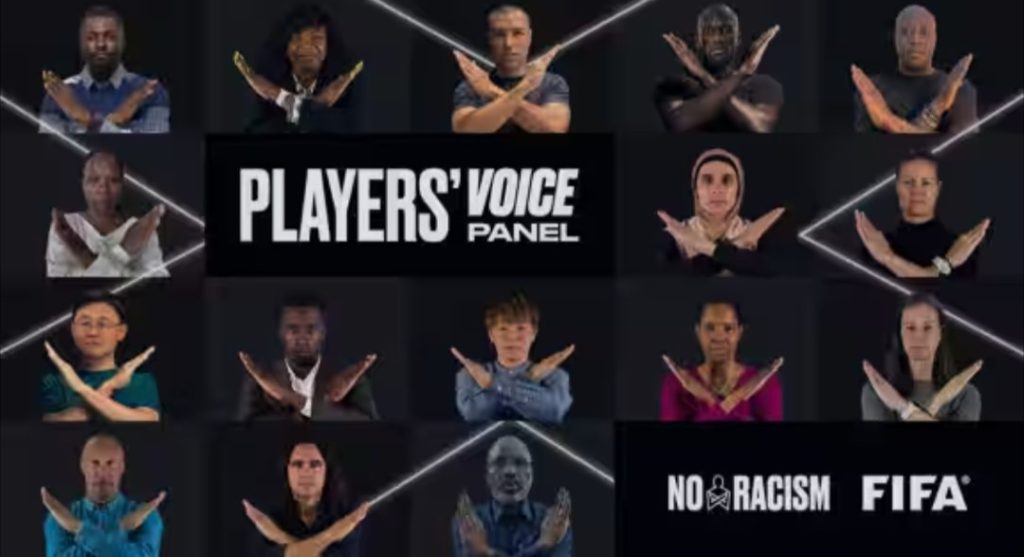FIFA, the international governing body of football, has taken a significant step in combating the pervasive issue of racism and discrimination within the sport by establishing a players’ voice panel. This panel comprises 16 esteemed former international footballers from diverse backgrounds, representing 14 member associations across all six FIFA confederations. The panel’s mission is to leverage the personal experiences and influence of these football legends to amplify anti-racism efforts, educate stakeholders at all levels, and advocate for tangible change both on and off the field. Among the distinguished members of this panel are Ivorian icon Didier Drogba and former Super Falcons striker Mercy Akide, alongside other notable figures such as George Weah, Emmanuel Adebayor, Khalilou Fadiga, and representatives from various countries across the globe.
The formation of this panel underscores FIFA’s commitment to tackling the deeply entrenched problem of racism in football, which continues to manifest in stadiums and online platforms. The panel’s members, having witnessed and experienced firsthand the detrimental effects of racism, are uniquely positioned to provide invaluable insights and recommendations for effective countermeasures. Their collective voice will serve as a powerful instrument in raising awareness, promoting education, and driving meaningful change within the football community and beyond. FIFA President Gianni Infantino emphasized the critical role of the panel in translating anti-racism rhetoric into concrete action, asserting that racism and discrimination are not mere errors but criminal acts that warrant full punishment within football and society at large.
The panel’s mandate encompasses several key areas of focus. Firstly, members will play a pivotal role in educating individuals at all levels of the game, from grassroots participants to professional players and administrators, about the insidious nature of racism and its devastating impact. They will share their personal experiences to highlight the emotional and psychological toll that racist abuse takes on individuals and the broader football community. By providing concrete examples of discrimination, they aim to foster greater empathy and understanding, ultimately shifting the culture towards zero tolerance.
Secondly, the panel will serve as a vital resource for FIFA, offering practical advice on developing and implementing comprehensive response strategies to combat racism. This includes advising on preventive measures to deter racist incidents, creating effective reporting mechanisms for victims, and ensuring that perpetrators face appropriate sanctions. The panel’s expertise will inform the development of robust policies and procedures that address racism in all its forms, both overt and subtle. Their recommendations will help to strengthen existing frameworks and introduce innovative approaches to tackling this complex challenge.
Thirdly, the panel will actively work to change the narrative surrounding racism in football. By sharing their personal stories and experiences, they will humanize the issue and challenge the pervasive normalization of racist behavior. They will advocate for greater accountability from clubs, governing bodies, and social media platforms, urging them to take decisive action against racism. They will also encourage victims to come forward and report incidents, emphasizing the importance of fostering a safe and inclusive environment where everyone feels empowered to speak out against discrimination.
Finally, the establishment of the players’ voice panel signifies a critical shift in FIFA’s approach to combating racism, recognizing the vital role of player advocacy in driving meaningful change. By empowering former players to lead the charge against discrimination, FIFA is acknowledging the profound impact that their voices can have in shaping the future of the sport. The panel’s formation is a direct response to growing calls for concrete action and reflects a commitment to moving beyond symbolic gestures towards tangible and impactful solutions. This initiative represents a significant step forward in creating a more just and equitable footballing world, sending a powerful message that racism will not be tolerated and that the fight for equality and inclusion is a shared responsibility.
The selection of Mercy Akide, a veteran of three Women’s World Cups, to this panel is particularly significant, highlighting the importance of including diverse perspectives and experiences in the fight against racism. Her presence underscores the global nature of this challenge and the need for concerted efforts across all regions and genders. Similarly, the inclusion of other African icons, such as Didier Drogba, George Weah, Emmanuel Adebayor, and Khalilou Fadiga, amplifies the voices of African players and acknowledges the specific challenges they face in terms of racism and discrimination.
Ultimately, the success of this panel will depend on the collective commitment of all stakeholders – players, fans, clubs, governing bodies, and media – to work together to eradicate racism from football. By amplifying the voices of former players, promoting education, and implementing effective response strategies, FIFA aims to create a more inclusive and equitable sporting environment for all. The establishment of the players’ voice panel marks a crucial turning point in the fight against racism, demonstrating a renewed determination to move beyond rhetoric and towards meaningful action.














